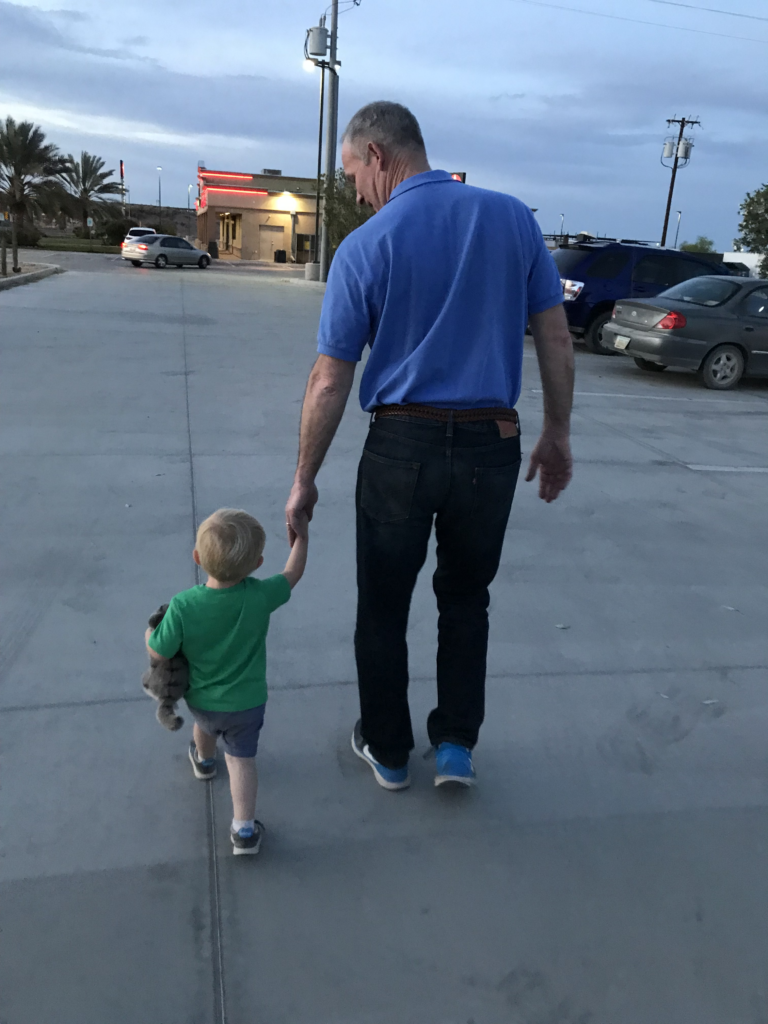Yesterday’s aphasia announcement for Bruce Willis stirred many emotions in our board members, all of whom either have aphasia, have a family member with aphasia, or work with people who have aphasia. This piece by board member Lauren Wisniewski speaks about her family’s journey with primary progressive aphasia. Hopefully, you will find it eye-opening and moving, bringing greater insight into what families experience after an aphasia diagnosis.
What a powerful, humbling, beautiful thing it is to go on a journey of loss. Loss finds you out of nowhere, sweeps you up and sets you down on an unknown path with no compass. You have to survive in this wilderness with only the tools that you know. Loss can be very lonely, but if you are lucky, you will find support along the way.
My loss comes from my dad’s diagnosis of primary progressive aphasia about nine years ago. It is my dad’s loss of the life he thought he would have. It is the slow loss of the dad I admire so much. It is my mom’s loss of the life she thought she would be sharing with my dad, especially in retirement. It is all of our family’s loss of a person we love and a life we thought we would be sharing together.
I don’t remember the exact moment when I was told of his diagnosis, but it was in the very early stages of the disease. He was receiving and sending emails, but my mom had to help him understand most of them and it was beginning to affect his work. His actions were a little odd for him, but he could still talk to us. I had no idea what primary progressive aphasia meant. I had to look it up and what I learned was that he would lose his ability to communicate, slowly, but progressively, and permanently.
In the late stages of the disease his cognitive abilities would be minimal. There were references to dementia, to Alzheimer’s disease, but they were only comparisons for understanding since they were more widely recognizable diseases. I certainly did not understand how different primary progressive aphasia was from other types of aphasia. This new world of my dad’s diagnosis felt really lonely. My parents were in contact with a good neurologist, but beyond the diagnosis we didn’t know what to do next. We didn’t know of anyone else who had this disease and we didn’t know where to go for help during our everyday life.
As my dad’s diagnosis progressed, it became even more lonely. We watched his abilities decline and there wasn’t anyone who could relate to what we were going through or what he was going through. We could only imagine how lonely he felt not being able to communicate. But, we did know that we had each other. There are very significant moments that are defined by how we stuck together as a family. For example, when my mom had to take care of home improvement projects, she would often call my brother and me to help her figure it out. We would come over, only to find that my dad had left us instructions. He left notes exactly where we would need them when we went to go figure out those tasks. He was there to help as well. I watched as my dad experimented with different techniques of remembering words. We all supported him by making sure he could live comfortably and happy, continuing those experiments and keeping a routine that he loves best.
Our family could certainly not have predicted the journey that was in store for us when my dad was diagnosed with primary progressive aphasia. We were all set down on a path of loss, and it mostly feels very lonely. But we have found support as well. I have read books from others who shared their story of a loved one experiencing primary progressive aphasia. I have learned so much from the National Aphasia Association, interacting with incredible professionals, other caregivers for someone with PPA, and people who have recovered from aphasia.
A brilliant psychologist at my son’s preschool once coached me on how to teach my son that it is okay to have two feelings at once. Upon hearing the news of Bruce Willis’ diagnosis, I have two feelings.
I am gripped with the grief that I have been carrying with my family for 9 years and I share that sadness for Mr. Willis and his family.
I am also hopeful.
I am grateful to Mr. Willis and his family for sharing this personal information and I hope that this moment in the news can help those who have aphasia. I hope it will make aphasia a more widely understood condition, so that those who have aphasia and their family members or caregivers feel less lonely. I hope it will contribute to small changes in society that make life easier and safer for those with aphasia. I hope it helps families heal and rally around one another to support their loved one.

Lauren is a Lean Process Facilitator for the State of Michigan and the founder of Rise Consulting Company, empowering nonprofits to maximize their impact through Lean principles. Lauren is passionate about the power of philanthropy as a tool for change and works to integrate Continuous Improvement with Social Impact. Read her full bio on our board of directors page.



